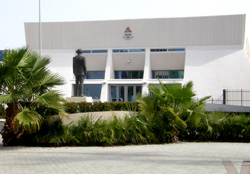Financial delays undermine ‘right to know’
 The recent report by the Auditor General’s office highlighting the numerous accounting failures by the vast majority of government departments, agencies and entities raises numerous concerns over issues of good governance, but it also raises problems in terms of undue secrecy andthe public’s right to know how their tax dollars are being spent.
The recent report by the Auditor General’s office highlighting the numerous accounting failures by the vast majority of government departments, agencies and entities raises numerous concerns over issues of good governance, but it also raises problems in terms of undue secrecy andthe public’s right to know how their tax dollars are being spent.
While Auditor General Dan Duguay is keen to ensure that the publication of The State of Financial Accountability Reporting puts the problem into the public domain and hopefully ensures the problem of serious delinquent accounting is finally addressed, he notes in the report that the failure of so many departments to complete all of the elements of their annual financial statements is preventing the public from gaining access to important information about government spending and accountability.
While some of the government entities have submitted financial statements, not one of them has submitted an annual report for the year 2006-07. Under the Public Management and Financial Law (PMFL) results remain confidential until the annual report is submitted to Members of the Legislative Assembly (MLA). Duguay explains in his report that the PMFL states that the annual reports become public documents once they are tabled in the Legislative Assembly (LA).
“If an annual report is not tabled then the contents of the annuals report, including the financial statements, are not public documents. As a result my office is not able to release those financial statements even though they are finalized,” he said. “I believe that this is a situation that should not be allowed to continue.”
Encouraging all the government entities to submit their reports and to comply with the requirements of the PMFL, he also said if government departments are going to continue to fail to meet this part of the law, his office should have some mechanism by which it can legally reveal the details of financial reports to MLAs. That way he could use the weight of the members of the house to demand that government departments follow the law.
“This would allow them to call for an organisation to prepare and deliver an annual report,” Duguay added. “Reporting of the financial statements by the Office of the Auditor General to the Legislative Assembly would allow the financial statements to become public and would allow their review by members of the public.”
With some government departments more than two years behind on their financial statements and annual reports, and others even more, Duguay says that this significant delay undermines the whole purpose and value of the statements. He added that the delay is so severe it threatens the very ability of the LA to provide oversight on government spending of behalf of the Caymanian people. He noted that by the time the 2004/05 statements of some entities are submitted to the LA they will be so out of date they will be practically meaningless. “They will probably be ignored as largely historical documents,” Duguay said. “A great opportunity has been largely wasted in that Legislators have not been able to see what had been accomplished with the money given to ministries and portfolios.”
Duguay explained that what happened in the past with spending would better inform the LA for future budgets. As a result, this year’s budget was approved with no accounting for the funds spent in the last four years, a situation that Duguay says in not acceptable.
Category: Local News


Supreme Court of the United States
"Anyone may so arrange his affairs that his taxes shall be as low as possible, he is not bound to choose that pattern which will best pay the treasury; there is not even a patriotic duty to increase one’s taxes."
Helvering V Gregory, 69 F.2d 809 (2d Cir. 1934), aff’d, 293 US
Argued December 4
Decided January 7, 1935
Full case name: Evelyn Gregory v. Guy T. Helvering, Commissioner of Internal Revenue
Citations: 293 U.S. 465; aff’g 69 F.2d 809 (2nd Cir., 1934)
Holding
The legal right of a taxpayer to decrease the amount of what otherwise would be his taxes, or altogether avoid them, by means which the law permits, cannot be doubted.
This shows both how much in need Cayman is of the new Freedom of Information Law, and how far Cayman is actually still removed from being ready to implement it (only 5 months before the supposed deadline for full implementation). Freedom of Information is meaningless unless it is accompanied by responsible record keeping, which should include the creation of a record of all of government’s actions, transactions and decisions. If vital financial information is not being created in the first place, then government can make all the claims it likes about being "transparent and open", but in the end there can and will be no access to the information and government will remain unaccountable.
Accountability does not stop with financial matters. There can be no accountability without responsible records management. The case highlighted by the Auditor General is first and foremost a neglect of duty to create information by means of which the general public (and the LA if it were not asleep at the helm) can keep the government accountable for its actions. This is an example of the non-creation of an adequate record and as such a violation of the Public Records Law (2007). This story should also be reported in this perspective.